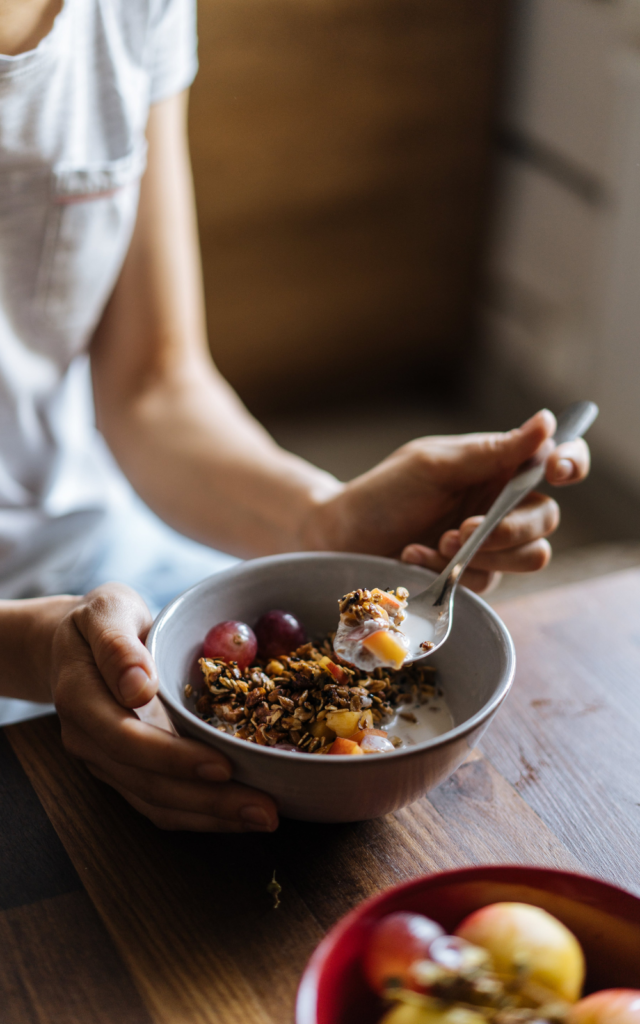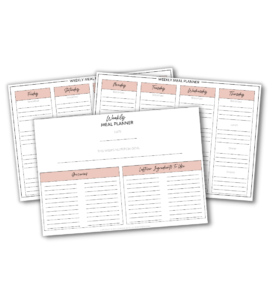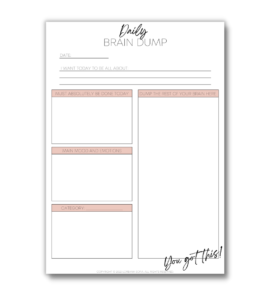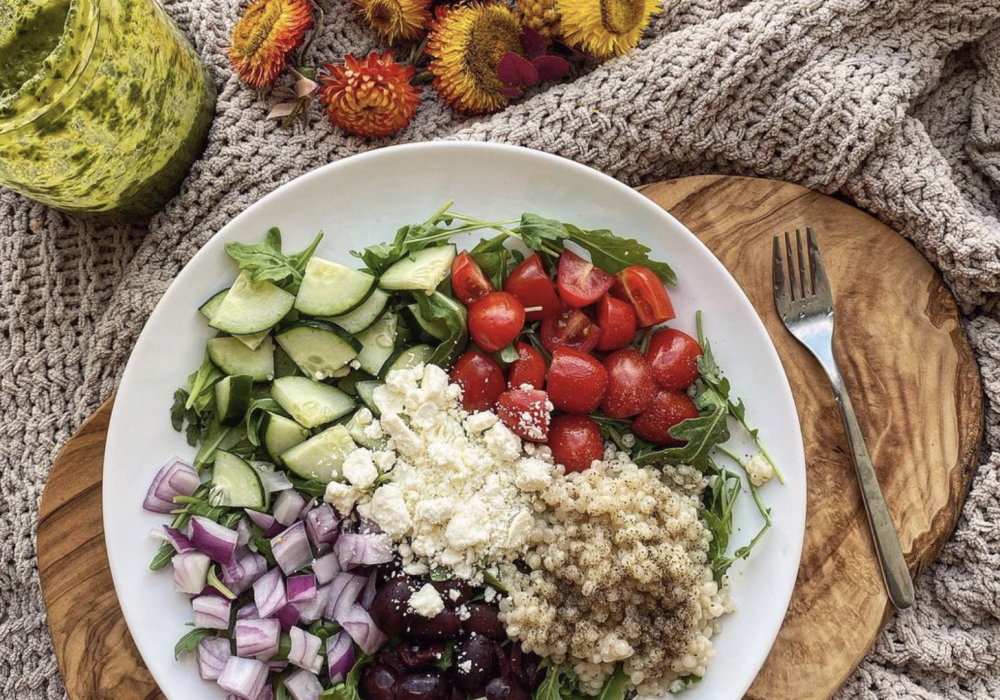Losing weight (and being able to keep it off!) is much more about the small habits you incorporate rather than the big changes. Here is a list of my favourite ones!

The small habits that you consistently include in your day-to-day will bring you significantly further than drastic changes that you can’t sustain.
I’ve used many of these small habits myself… and so have my clients. They have been extremely successful!
So give them an honest shot! I promise you’ll be surprised.
This blog post is all about the small habits for mindful eating and weight loss.
16 SMALL HABITS FOR MINDFUL EATING & WEIGHT LOSS
Before Eating...
1. Figure Out If It's Hunger or Thirst
Let me preface this by saying that being hungry IS NOT A BAD THING.
Being hungry should not be something you should try to avoid, be ashamed about, or be something that you try to repress. Hunger is something that can only be “healed” with food. Not coffee, not water, not pills. Food.
However, in a world of ultra-processed and high-sodium foods, being hungry is very often confused with just being thirsty.
So if you’re the type of person who doesn’t drink water regularly, it might just be that your body is asking for water.
However, if you feel like you’re generally a rather hydrated person, or if you haven’t eaten in a significant amount of time, then please, by all means, EAT.
2. Figure Out Exactly What Your Body WANTS To Eat
Have you ever been REALLY hungry, and found something you really like to eat… but it ended up not being satisfying?
Like, you know that you usually really love a smoked salmon bagel, but this time it really didn’t do the thing? Yet you were REALLY hungry?
This is probably because you didn’t give your body what it was hungry for.
So, next time that you are looking for something to eat, try asking yourself the following question: What exact food is my body asking me for? Is it:
- Sweet or savoury?
- Crunchy or creamy?
- Fresh or warm?
- A full meal or a snack?
- Fruits or vegetables?
- Salmon with a side of rice or a big green salad?
If you have many choices in front of you, look through them and try to tune into your own body. Which of these choices would really hit the spot?
Now, believe me, this is NOT easy. It takes a lot of time to be able to really listen to your body. A lot of trial and error goes into being able to identify which sign is associated with which food.
But the more you start doing this, the more you’ll be able to tell what it really is you want to eat.
Nutrition Coaching
Train hard. Eat well. Build your body one day at a time.
Train hard. Eat well.
Build your body one day at a time.
1-to-1 coaching. A sustainable nutrition plan. A lifetime of knowledge.
3. Always Include the 3 Macronutrients
When choosing what to eat, try as much as possible to have all three macronutrients included. And if you can’t, then at least try to include some protein. This is why:

This is your stomach when you’ve only eaten fats. Fats take a long time to digest, but they don’t take up much space at all despite their calories.
So you’ll be left feeling hungry very quickly.

This is your stomach on fats and carbs.
Carbs, such as fruits and veggies, can take up a lot of space if they are naturally occurring (a concept called volume eating).
However, carbs are quickly digested by our bodies. So even if you’re stuffed right after eating them, you’ll go back to feeling hungry rather quickly.

Finally, this is your stomach after fats, carbs AND proteins.
Proteins can take up A LOT of space. AND, like fats, they are digested more slowly than carbs are.
Not only that, but because they digest slowly, everything else in your stomach digests a lot slower too.
So this is why you want to be eating all 3 macronutrients! It helps you stay fuller for longer, and makes being in a calorie deficit far easier.
4. Make Whole-Foods Swaps
Bouncing off the above, remember how I said that carbs allow for volume eating (aka, eating a lot for not many calories).
Well, that’s the case with naturally occurring carbs, NOT processed carbs. So all your pop-tarts, pizza rolls, Skittles and other such things are not going to help you stay fuller for longer.
Don’t get me wrong, there is definitely a place for all those types of foods. However, when it comes to weight loss, they aren’t exactly friendly. They pack a lot of calories and they don’t leave you feeling full for long.
So when you’re making yourself something to eat, try making whole-food and unprocessed choices.
Instead of a protein bar, go for yoghurt and fruits with a bit of honey. Instead of store-bought pizza, try making it yourself with fresh ingredients. I promise you, it’s worth the extra effort.
5. Settle Down When You're Eating
This might sound a little cooky, but it makes all the difference.
When you’re eating, give yourself permission to JUST eat. Sit down at the kitchen table, put your food on a plate, get yourself a glass of water and just eat.
Don’t do it towering over your kitchen sink. Don’t do it rushing out of the house. Don’t eat it out of a napkin.
Even if it’s the smallest snack, sit down and eat.
Want a free
MONTHLY HABIT TRACKER?
Set out small goals for yourself and see how your day-to-day improves with this Monthly Habit Tracker. Fill out the form below and have the Habit Tracker delivered straight to your inbox!
While You're Eating...
6. Let Your Brain Catch Up To Your Stomach
So here’s the thing: your brain, for all its amazing qualities, is a lil bit slow when it comes to catching up with your hunger and fullness cues.
You can be eating, but only about 30 minutes later will your brain catch up to how full your stomach is.
So when people tell you to SLOW DOWN when you’re eating… this is why. Slow down that way your brain gets the message that you’re full.
This is hard because when we’re hungry, we just wanna eat, and eat, and eat. It’s hard to slow down when you’re used to chowing down on everything in front of you.
So try to give it a go, and slow down.
7. Put Your Cutlery Down Between Bites
This is another cooky trick that I’ve learnt. There’s nothing scientific behind this, it just forces you to slow down.
Between bites, put your cutlery down. Before picking them up, finish swallowing whatever is in your mouth.
It will allow you to pace yourself, and be able to enjoy the food a lot more since you’re focusing more on the food itself, rather than getting the next bite into your mouth.
8. Eat Without Distractions Or...
I know you’re TIRED of hearing this… but it’s the things we don’t want to hear that need to be said.
As much as possible, try eating without distractions. Turn off the phone, turn off the TV… just turn it off and be present in the action of overeating.
If you’re curious to know why, you can read this blog post:
{Related article: Why You Shouldn’t Be Eating While Watching TV}
9. Serve Yourself Less Than Normal
If you do however eat while watching TV, try using smaller portion sizes.
People might come after me for this advice, but I think it’s a great trick when you’re trying to lose weight.
When you’re in a calorie deficit, it is inevitable that you’ll be hungry. You’re functioning below the level of energy needed… so it’s bound to happen. However, it’s about knowing how to minimize the discomfort of feeling that.
So volume eating is a way of not feeling so hungry all the time.
And distracting yourself is another one. So if you’re able to eat less while you watch TV, then that’s good enough for me. But take advantage of the distraction and serve yourself a smaller portion than you normally would.
Not too small though, just a little bit smaller.

Want a free
WEEKLY MEAL PLANNER?
Get organized and plan your meals with this Weekly Meal Planner. Fill out the form below and have the Weekly Meal Planner delivered straight to your inbox!
After Eating...
10. Start Paying Attention To How The Food Leaves You Feeling
All in the effort of intuitive eating, you need to figure out how foods make you feel.
So after eating, take time to ask yourself the following questions:
- Did I really enjoy that meal? What about it did I enjoy?
- Did it leave my body feeling energized or does it leave me feeling drowsy? Bloated?
- Did I eat too much? When should I have stopped?
- Is there anything I could have done to make this meal better?
- What have I learnt for next time?
11. Immediately Put Extra Food Away
Are you guilty of serving yourself the right portion… but then when you go to clean the kitchen, you start taking bites out of the extra food left in the pan?
Well, I am. And these calories, as small as they might seem, add up.
So, as soon as I’m done cooking, I set aside the portion that I will eat and immediately put away all the extra food. It’s stopped me from taking those extra bites while cleaning, and oftentimes leaves me enough leftovers for a satiating snack the next day!
12. Pay Attention To How Quickly You Get Hungry Again
In the same effort to get to know yourself, pay attention to how quickly you feel hungry again.
If it’s within an hour, then what you had was not enough. Then ask yourself: what could you have changed? What more should I have eaten?
Obviously, if the purpose of the meal was just a quick snack to tide you over, then that’s fine. But if it was supposed to be lunch and you’re left hungry soon after… then there’s something to rectify there.
On the other hand, if you start getting hungry a couple of hours later, then that’s totally fine.
If You've Overeaten...
13. Trace Back Your Steps To Figure Out What Caused It
The vast majority of the time, overeating is caused by an emotional trigger.
So if you’ve overeaten, start thinking back to what caused it. This might be a painful and uncomfortable process, but it is something that you absolutely need to do.
What exactly was it you felt? When did the emotional eating start? What did you reach for?
Information is power, so you really want to gather as much information as you can regarding this. It’ll only make you more prepared.

Want a free
DAILY BRAIN DUMP WORKSHEET?
Start your day on the right foot with this amazing Daily Brain Dump. Fill out the form below and have the Daily Brain Dump worksheet delivered straight to your inbox!
14. Let Yourself Feel The Pain
Next time that you binge eat, you WILL feel like shit (I don’t think I have to tell you that). And you’ll probably try to escape that feeling. Either by going to sleep, watching TV… just whatever to escape that feeling.
But don’t. Live in the pain. Feel the pain. Brew in the pain until you REALLY feel it.
I know that this is a REALLY controversial opinion. Most people might not agree with this way of dealing with things. But I think being able to confront and live with your feelings is the healthiest thing you can do for yourself.
Over time, you will stop associating binge eating with a soothing mechanism that helps you deal with whatever emotion you’re trying to heal (whether it’s stress, anxiety, sadness…) Instead, you’ll start associating it with the really shitty state that binge eating leaves you in.
And next time you’ll want to binge eat, you’ll only remember that shitty feeling. And you’ll curve binge eating, at least sometimes.
It will TAKE TIME. But it’ll help. And to be fully honest, this is the #1 tip from this whole list. It’s what helped me more than anything.
15. Make A Plan For What You'll Do Next Time
Once you know WHY you’ve overeaten and you’ve lived in the pain, it’s time to make a plan for next time.
What will you to prevent overeating next time, or at least minimize it?
- Will you call a friend?
- Will you go out for a walk?
- Will you watch TV to distract you?
- Will you start cleaning (this is what I used to do…)
- Maybe be prepared with a really big bag of shredded lettuce and just munch off that instead of high-calorie foods.
16. Do WHATEVER feels right
Now that you’ve lived in the pain, there’s no use in staying in pain (provided that you’ve really allowed yourself to feel the pain).
So now do whatever feels right. This time is about you.
Short of anything self-destructive (purging, another round of binge eating, trying to “detox”, …), do WHATEVER feels good.
I hope these tips have helped you. This are the exact small habits that has helped me heal my binge eating and allowed me to eat mindfully.
This blog post was all about the small habits for mindful eating and weight loss.








